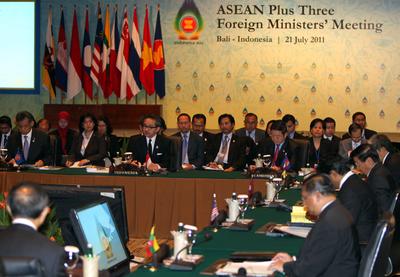The ARF — ‘Avoiding Regional Flashpoints’, if you will — has garnered a reputation for keeping hard security challenges off its agenda, and doing little when such issues happen to force their way in.
In functional terms, the 18th ARF meeting will likely produce few surprises. The ARF meeting in Hanoi last July produced a plan of action for implementing the ARF Vision Statement. The vision statement outlined goals for enhanced collaboration in a number of ‘areas of cooperation’, but little progress will be expected this year toward their anticipated completion in 2020. Opinion over the ARF’s ability to implement an ‘action-oriented’ agenda has been cautionary at best. Disputes over the South China Sea (SCS), and other diplomatic flare ups in the region have made for a thorny run-up to the Forum. How the Forum operates in the context of these flashes, and whether it will be useful for teasing out these issues, will be an interesting test of its maturity.
Blame for the ARF’s inaction is usually placed on the big powers, particularly China, for their evident preference for treating such issues as bilateral rather than multilateral in nature, and smaller countries that might otherwise seek multilateral solutions eschew doing so for fear of angering Beijing. The US has gone some way to shaking up this dynamic. At the 2010 meeting in Hanoi, US Secretary of State Hillary Clinton took umbrage with alleged Chinese references to the SCS as part of China’s ‘core interests’ — a category normally reserved for Taiwan and Tibet — and urged the creation of a binding code of conduct for the six claimant countries (including China) as well as a ‘collaborative diplomatic process’ for resolving their claims. As Douglas Paal recently noted, Mrs Clinton’s comments implied that Beijing’s position on the Sea constituted a violation of the Declaration of the Conduct of Parties in the South China Sea (DOC) of 2002.
On top of the SCS dispute, other diplomatic flare ups have complicated the Forum’s context. In June,Vietnam accused China of harassing a Vietnamese seismic survey boat and damaging its research cable, while China demanded that Vietnam halt oil exploration activities in the area.Vietnam responded with a slew of nationalistic demonstrations and naval exercises. Later that month, following Mrs Clinton’s talks with Philippine counterpart Albert del Rosario, Mrs Clinton clarified that the US would not take sides in the SCS disputes. She also reaffirmed Washington’s commitment to the defence of the Philippines as part of their longstanding mutual alliance arrangement, amid rising tensions in the Sea. (Manila has complained of nine separate incursions by Chinese vessels into its territorial waters since late February.)
Despite these events, recent developments suggest the meeting in Bali could prove less volatile than last year’s. As part of their bilateral Strategic and Economic Dialogue,Beijing and Washington have taken to conducting ‘Asia Pacific consultations’, the first of which were held in Hawaii on 25 June. Although China went into the consultations holding firm to its inveterate view that countries should refrain from ‘internationalising’ the SCS disputes, its relative silence since those talks — and, as Paal has noted, its ‘increasingly UNCLOS (United Nations Convention on the Law of the Sea) observant approach to the issues’ — imply China could be seeking to preclude an escalation of tensions, at least for now. With non-claimants such as Singapore also calling on China to clarify its claims, the pressure on Beijing to rely less on nebulous ‘historical’ claims — as in the case of its nine-dotted U-shaped line covering virtually the entire expanse of the SCS — and more on narrower, UNCLOS-based rationalisations is rising.
The US also has an interest in managing tensions with China. Writing for The Washington Post, Fareed Zakaria has cautioned against his fellow pundits’ quest to find a new grand strategy in President Obama’s foreign policy, suggesting that ‘strategic restraint’ best explains the president’s non-doctrinarian approach to international affairs. For all its recent bad press,China is generally restraint-minded as well. As some Chinese analysts have implied,Beijing’s assertiveness towards Hanoi over the seismic boat incident could have been due to Chinese perceptions that Vietnam failed to reciprocate Beijing’s efforts to assuage Hanoi’s anger over joint Sino–US oil exploration in a disputed area near the Spratly islands during the early 1990s.
For all its faults, the ARF has done one thing well: bring big powers and regional countries together into regular dialogue with one another. While the vision of serious security discussions among and across all 27 participants is probably far fetched, the Forum could be a venue for focused dialogue on pressing political and strategic concerns, not least on the SCS, among interested parties, even if only on the Forum’s side-lines.
Should regional flashpoints enjoy airtime at the ASEAN Regional Forum, rather than be assiduously avoided, the ARF will accomplish a key objective even if no solutions are immediately apparent. The journey from talk-shop to workshop is long and winding, and success is far from assured. But it certainly helps to get the basics right.
See Seng Tan is Deputy Director of the Institute for Defence and Strategic Studies, Head of the Centre for Multilateralism Studies, and Associate Professor at the S. Rajaratnam School of International Studies, Nanyang Technological University, Singapore.

